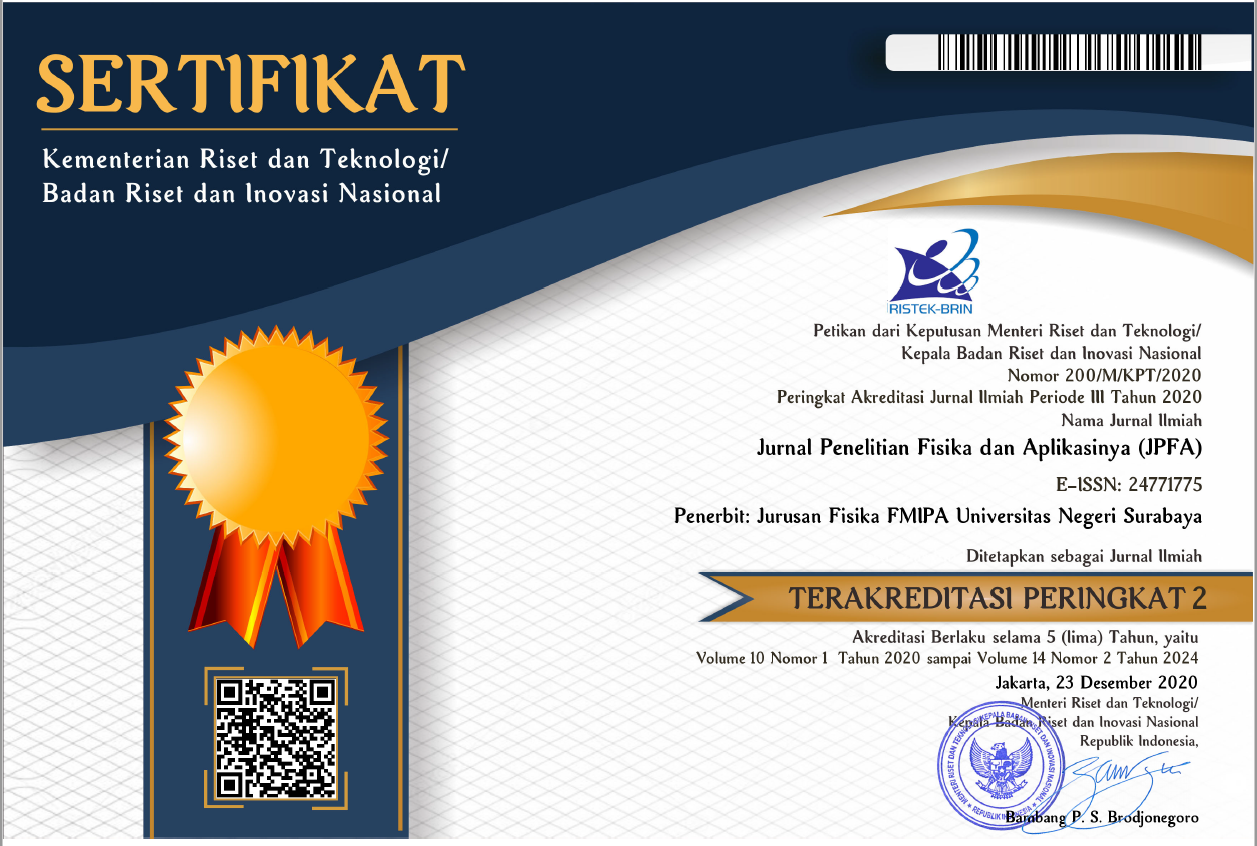The Effect of Copper-Silver (Cu-Ag) Double Doping on ZnO Photoanode on Dye Sensitized Solar Cell (DSSC) Efficiency
DOI:
https://doi.org/10.26740/jpfa.v14n2.p144-153Keywords:
Copper, Silver, Double Doping, ZnO Photoanode, DSSC EfficiencyAbstract
A DSSC has a good performance seen from the ability of the photoanode to absorb sunlight. The use of photoanodes uses a semiconductor material, namely ZnO. However, in use, ZnO has the disadvantage of low optical and electrical properties, which results in low DSSC efficiency. So in this research, efforts are made to add Cu-Ag double doping to improve optical and electrical properties that will increase the efficiency of DSSC. ZnO/Cu-Ag photoanodes were prepared using the sol-gel spin coating method with doping variations of 0%, 1%, 2%, and 3%. Characterization was carried out using a UV-Vis spectrophotometer to see the absorption area and determine the band gap energy of the ZnO photoanode. I-V Keithley was used for current and voltage characterization to determine the conductivity of the ZnO photoanode and the efficiency of the DSSC. The results of the research show the effect of increasing the optical properties of ZnO photoanodes by decreasing the band gap energy along with the increase in doping concentration, namely 3.29 eV, 3.24 eV, 2.44 eV, and 2.40 eV. In addition, there is an increase in conductivity on the ZnO photoanode with the highest conductivity at doping concentration of 3% which is 0.1006 Ω-1m-1 with an increase of 6 times compared to the pure ZnO photoanode of 0.0163 Ω-1m-1. The improved optical and electrical properties of ZnO/Cu-Ag photoanodes have an impact on increasing the efficiency value of DSSC with the optimum efficiency achieved at 1% doping concentration of 0.0291% with an increase of 16 times compared to the use of pure ZnO photoanode of 0.00018%. The addition of Cu-Ag doping to ZnO improves the optical and electrical properties of the photoanode, enhancing DSSC efficiency with an optimum at 1% doping concentration.
References
Esgin H, Caglar Y, and Caglar M. Photovoltaic Performance and Physical Characterization of Cu Doped ZnO Nanopowders as Photoanode for DSSC. Journal of Alloys and Compounds. 2022; 890: 161848. DOI: https://doi.org/10.1016/j.jallcom.2021.161848.
Warman JF and Dahlan D. Sintesis Lapisan Titanium Dioxide dengan Doping Ganda Copper-Silver untuk Aplikasi Fotoanoda Dye Sensitized Solar Cell. Jurnal Fisika Unand. 2020; 9: 415–420. DOI: https://doi.org/10.25077/jfu.9.3.415-420.2020.
Joseph I, Louis H, Unimuke TO, Etim IS, Orosun MM, and Odey J. An Overview of the Operational Principles, Light Harvesting and Trapping Technologies, and Recent Advances of the Dye Sensitized Solar Cells (Review). Applied Solar Energy. 2020; 56: 334–363. DOI: https://doi.org/10.3103/S0003701X20050072.
Nursam NM. Pengaruh Material Counter Electrode Pada Dye-Sensitized Solar Cell. Metalurgi. 2020; 34: 109–130. DOI: https://doi.org/10.14203/metalurgi.v34i3.489.
Omar A, Ali MS, and Rahim NA. Electron Transport Properties Analysis of Titanium Dioxide Dye-Sensitized Solar Cells (TiO2-DSSCs) Based Natural Dyes Using Electrochemical Impedance Spectroscopy Concept: A Review. Solar Energy. 2020; 207: 1088–1121. DOI: https://doi.org/10.1016/j.solener.2020.07.028.
Mehmood B, Khan MI, Iqbal M, Mahmood A, and Al-Masry W. Structural and Optical Properties of Ti and Cu Co-Doped ZnO Thin Films for Photovoltaic Applications of Dye Sensitized Solar Cells. International Journal of Energy Research. 2021; 45: 2445–2459. DOI: https://doi.org/10.1002/er.5939.
Lanjewar M and Gohel JV. Enhanced Performance of Ag-Doped ZnO and Pure ZnO Thin Films DSSCs Prepared by Sol-Gel Spin Coating. Inorganic and Nano-Metal Chemistry. 2017; 47: 1090–1096. DOI: https://doi.org/10.1080/24701556.2016.1241275.
Hanavi DP, Afrilia CG, Safriani L, and Aprilia A. Sintesis ZnO Serbuk dan Penggunaannya Sebagai Fotoanoda Pada Sel Surya Tersensitisasi Warna. JMEI: Jurnal Material dan Energi Indonesia. 2019; 09: 44–52. DOI: https://doi.org/10.24198/jmei.v9i01.24323.
Syahra NC and Iwantono. Pengaruh Doping Ti terhadap Sifat Fisis Nanorod ZnO dan Untuk Kerja Dye Sensitized Solar Sell. Prosiding SNFA (Seminar Nasional Fisika dan Aplikasinya). 2020; 5: 15–17.
Supu I, Setiawan DGE, Latief MF, Ismail SYN, and Sari YI. Morphology and Optical Properties Analysis of Cu2+ Doped ZnO for Preparation Dye Sensitized Solar Cell (DSSC). EKSAKTA Berkala Ilmiah Bidang MIPA. 2022; 23(3): 211–222. DOI: https://doi.org/10.24036/eksakta/vol23-iss03/330.
Siagian SM. Analisis Semikonduktor zno:cu Terhadap Efisiensi Dye Sensitized Solar Cell Menggunakan Ekstrak Alami. Jurnal Elektro dan Mesin Terapan. 2021; 7: 51–57. DOI: https://doi.org/10.35143/elementer.v7i2.5145.
Ekmekci M, Ela Ç, Erten-Ela S, and Yavuz Ç. Synthesis of Ag-Doped ZnO Nanomaterials for Dye Sensitized Solar Cells and Investigation of The Optimum Ag Doping Rate. Usak University Journal of Engineering Sciences. 2021; 4: 104–123. DOI: https://doi.org/10.47137/uujes.1016758.
Pan C, Gaur APS, Lynn M, Olson MP, Ouyang G, and Cui J. Enhanced Electrical Conductivity in Graphene-Copper Multilayer Composite. AIP Advances. 2022; 12: 015310. DOI: https://doi.org/10.1063/5.0073879.
Das A, Wary RR, and Nair RG. Cu Modified ZnO Nanoflakes: An Efficient Visible Light-Driven Photocatalyst and A Promising Photoanode for Dye Sensitized Solar Cell (DSSC). Solid States Sciences. 2020; 104: 106290. DOI: https://doi.org/10.1016/j.solidstatesciences.2020.106290.
Zhuang G, Liu H, and Chen X. High-Performance Dye-Sensitized Solar Cells Using Ag-Doped CoS Counter Electrodes. RSC Advances. 2018; 8: 18792–18799. DOI: https://doi.org/10.1039/C8RA02765J.
Meldayani R, Iwantono I, Rini AS, and Rati Y. Analisa Sifat Fisis Nanopartikel ZnO di-Doping Ag Yang Disintesis Menggunakan Metode Biosintesis. Komunikasi Fisika Indonesia. 2022; 19: 7-10. DOI: https://doi.org/10.31258/jkfi.19.1.7-10.
Alqadi MK, Migdadi AB, Alzoubi FY, Al-Khateeb HM, and Almasri AA. Influence of (Ag–Cu) Co-Doping on The Optical, Structural, Electrical, and Morphological Properties of ZnO Thin Films. Journal of Sol-Gel Science and Technology. 2022; 103: 319–34. DOI: https://doi.org/10.1007/s10971-022-05785-1.
Kant R, Jakhar R, and Sharma A. Enhanced Dielectric and Optical Performance of (Cu, Ag) Co-Doped ZnO Nanostructures for Electronic Applications. Materials Technology. 2022; 37: 2679–2691. DOI: https://doi.org/10.1080/10667857.2022.2058835.
Windayani W, Iwantono I, Awitdrus A, and Zulkarnain Z. Efek Penambahan Atom Tembaga (Cu) dan Perak (Ag) Pada Material Aktif Nanomaterial ZnO Sel Surya Fotoelektrokimia. Komunikasi Fisika Indonesia. 2019; 16: 20-24. DOI: https://doi.org/10.31258/jkfi.16.1.20-24.
Dhamodharan P, Manoharan C, Bououdina M, Venkadachalapathy R, and Ramalingam S. Al-Doped ZnO Thin Films Grown onto ITO Substrates as Photoanode in Dye Sensitized Solar Cell. Solar Energy. 2017; 141: 127–144. DOI: https://doi.org/10.1016/j.solener.2016.11.029.
Sahumena MH, Ruslin R, Asriyanti A, and Djuwarno EN. Identifikasi Jamu Yang Beredar Di Kota Kendari Menggunakan Metode Spektrofotometri Uv-Vis. Journal Syifa Sciences and Clinical Research. 2020; 2: 65–72. DOI: https://doi.org/10.37311/jsscr.v2i2.6977.
Munandar MR, Hakim ASR, Puspitadindha HA, Andiyani SP, and Nurosyid F. The Effect of Mixing Chlorophyll-Antocyanin as A Natural Source Dye on The Efficiency of Dye-Sensitized Solar Cell (DSSC). Journal of Physics: Conference Series. 2022; 2190: 012042. DOI: https://doi.org/10.1088/1742-6596/2190/1/012042.
Ge Z, Wang C, Chen T, Chen Z, Wang T, Guo L, et al. Preparation of Cu-doped ZnO Nanoparticles Via Layered Double Hydroxide and Application for Dye-Sensitized Solar Cells. Journal of Physics and Chemistry of Solids. 2021; 150: 109833. DOI: https://doi.org/10.1016/j.jpcs.2020.109833.
Chitradevi T, Lenus AJ, and Jaya NV. Structure, Morphology and Luminescence Properties of Sol-Gel Method Synthesized Pure and Ag-Doped ZnO Nanoparticles. Materials Research Express. 2019; 7(1): 015011. DOI: https://doi.org/10.1088/2053-1591/ab5c53.
Rehman AU, Aslam M, Shahid I, Idrees M, Khan AD, Batool S, et al. Enhancing The Light Absorption in Dye-Sensitized Solar Cell By Using Bilayer Composite Materials Based Photo-Anode. Optics Communications. 2020; 477: 126353. DOI: https://doi.org/10.1016/j.optcom.2020.126353.
Siagian SM, Khairani S, Chrisna HSS, and Tampubolon FR. Sintesis dan Karakteristik Sifat Optik Semikonduktor ZnO dan ZnO Dopping Cu. Orbita Jurnal Pendidikan dan Ilmu Fisika. 2022; 8(1): 79-83. DOI: https://doi.org/10.31764/orbita.v8i1.8406.
Singh A, Mohan D, Ahlawat DS, and Richa. Performances of Spin Coated Silver Doped ZnO Photoanode Based Dye Sensitized Solar Cell. Processing and Application of Ceramics. 2017; 11(3): 213–219. DOI: https://doi.org/10.2298/PAC1703213S.
Amjad M, Khan MI, Alwadai N, Irfan M, Ikram-Ul-haq, Albalawi H, et al. Photovoltaic Properties of ZnO Films Co-Doped with Mn and La to Enhance Solar Cell Efficiency. Nanomaterials. 2022; 12: 1–17. DOI: https://doi.org/10.3390/nano12071057.
Nguyen DT, Kurokawa Y, and Taguchi K. Enhancing DSSC Photoanode Performance by Using Ni-Doped TiO2 to Fabricate Scattering Layers. Journal of Electronic Material. 2020; 49: 2578–2583. DOI: https://doi.org/10.1007/s11664-020-07965-7.
Saputrina TT and Umar AA. Performances of Dye-Sensitized Solar Cell (DSSC) with Working Electrode of Aluminum-Doped ZnO Nanorods. Sintechcom Science, Technology and Communication Journal. 2020; 1(1): 1–7. DOI: https://doi.org/10.59190/stc.v1i1.22.
Habibi MH, Mardani M, Habibi M, and Zendehdel M. Enhanced Photovoltage (Voc) of Nano-Structured Zinc Tin Oxide (ZTO) Working Electrode Prepared By A Green Hydrothermal Route for Dye-Sensitized Solar Cell (DSSC). Journal of Materials Science: Materials in Electronics. 2017; 28: 3789–3795. DOI: https://doi.org/10.1007/s10854-016-5989-9.
Downloads
Additional Files
Published
How to Cite
Issue
Section
License
Copyright (c) 2024 Jurnal Penelitian Fisika dan Aplikasinya (JPFA)

This work is licensed under a Creative Commons Attribution-NonCommercial 4.0 International License.
Author(s) who wish to publish with this journal should agree to the following terms:
- Author(s) retain copyright and grant the journal right of first publication with the work simultaneously licensed under a Creative Commons Attribution-Non Commercial 4.0 License (CC BY-NC) that allows others to share the work with an acknowledgement of the work's authorship and initial publication in this journal for noncommercial purposes.
- Author(s) are able to enter into separate, additional contractual arrangements for the non-exclusive distribution of the journal's published version of the work (e.g., post it to an institutional repository or publish it in a book), with an acknowledgement of its initial publication in this journal.
The publisher publish and distribute the Article with the copyright notice to the JPFA with the article license CC-BY-NC 4.0.
 Abstract views: 435
,
Abstract views: 435
, PDF Downloads: 770
,
PDF Downloads: 770
, PDF Downloads: 0
PDF Downloads: 0








